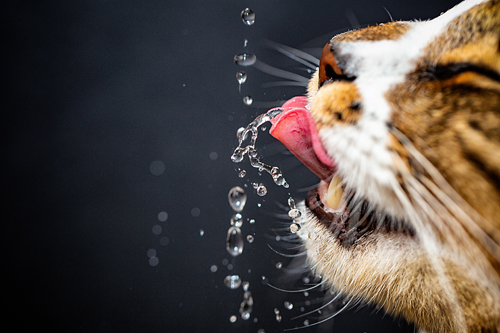
Does your cat's water bowl remain untouched, day after day? Do you seldom catch them drinking water?
Most cats do not drink enough water to stay adequately hydrated. As carnivores, they prefer to take in moisture through their food. If your cat eats a primarily dry kibble diet, they are especially prone to getting dehydrated.
Learn the signs of dehydration in cats, and how you can increase your cat's water intake to keep them healthy.
Signs Of Dehydration In Cats
Low water intake doesn't always mean your cat is dehydrated, though most cats can still benefit from more moisture. Check for these signs to see if your cat is in immediate need of hydration:
- Skin "tenting." Gently pull upwards at the scruff of your cat's neck. If your cat is dehydrated, the skin will take a long time to sink back down. The skin of a hydrated cat is "elastic," and immediately slides back into place.
- Lethargy or depression. Does your cat seem weak or drowsy, or just not themself?
- Dull, sunken eyes. Does your cat appear tired or less alert than usual?
- Constipation. Does your cat have trouble pooping, and when they do, is their poop in the form of hard pellets?
- Decreased urine output. Has your cat been making fewer trips to their litter box, or is their litter staying unsoiled for longer than usual?
- Increased heart rate. A dehydrated cat has a lower blood volume, so the heart must pump faster to compensate. You may notice your cat's rapid heart rate while they're sitting on your lap, or you can check their pulse by pressing two fingers at a point just behind their front leg. Normally, your cat's heart rate will be between 140 and 220 beats per minute.
Why Your Cat Won't Drink Water
Your cat may avoid drinking water if they're not pleased with their water source. Some cats won't drink tap water, but will sip on bottled or filtered water.
Your cat may avoid drinking from their bowl because of a long-held instinct to avoid standing water. In the wild, stagnant water is more likely to harbor harmful pathogens. See if your cat is attracted to flowing water sources, like your sink faucet or a pet water fountain.
Increasing Your Cat's Water Intake
Canned cat food is typically 75-80% moisture, so Switching Your Cat From Dry to Canned Food will make a big difference in keeping them hydrated.
You can also make "beverages" for your cat that you can pour over their food or offer between meals. Tinned tuna juice, goat's milk, clam juice, and low-sodium broth can all be used to help your cat fight dehydration. You can mix any of them with water, use them to make flavored ice cubes, or serve them as-is. Make sure the broth does not contain onions or garlic, which are both toxic to cats.
Severe Dehydration In Cats
You can usually resolve mild dehydration at home by encouraging your cat to drink water.
Sometimes, though, dehydration is a medical emergency. Dehydration can lead to organ failure, seizures, and in the worst cases, death.
If your cat has been losing fluids through vomiting or diarrhea and they're unable to hold down liquids, or if they seem to be distressed, seek urgent veterinary care through your regular veterinarian or an emergency vet clinic.












































